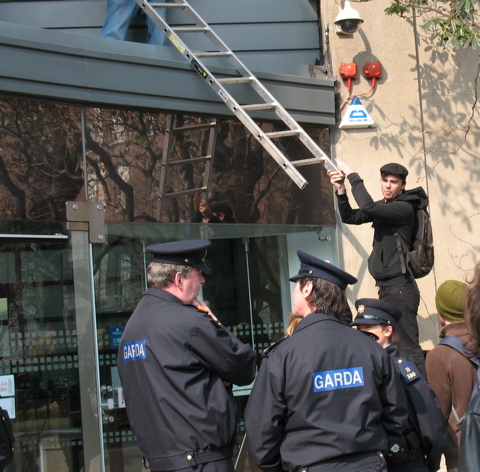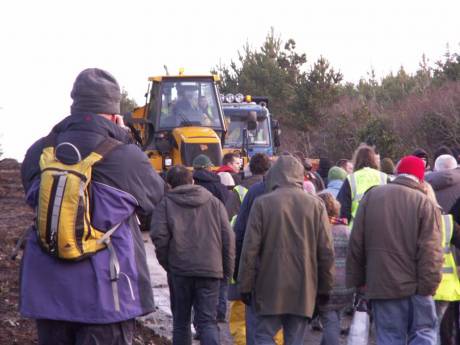Over 30 years of anarchist writing from Ireland listed under hundreds of topics
Newsroom
Report of succesful blockade of Shell HQ in Dublin
 This morning at 7.30 Dublin Shell to Sea members brought a taste of Mayo to Corrib House. Over 50 people took part in an ongoing blockade of the three entrances of the Shell HQ. The protest was peaceful with protesters linking arms and standing in front of the cars of employees as they attempted to enter the underground car park. According to Dublin Shell to Sea the aim of the blockade was "to shut down Shell E&P Ireland's offices ... to highlight the giveaway of Ireland's offshore gas."
This morning at 7.30 Dublin Shell to Sea members brought a taste of Mayo to Corrib House. Over 50 people took part in an ongoing blockade of the three entrances of the Shell HQ. The protest was peaceful with protesters linking arms and standing in front of the cars of employees as they attempted to enter the underground car park. According to Dublin Shell to Sea the aim of the blockade was "to shut down Shell E&P Ireland's offices ... to highlight the giveaway of Ireland's offshore gas."
Why Occupy Corrib House? - End the Gas Giveaway!
 This morning myself and a number of my comrades from the WSM along with members of Eirigi occupied the roof and reception of Corrib House to draw attention to the state giveaway of Irelands natural resources. Outlined here is my understanding of why we need to act to regain control of our resources.
This morning myself and a number of my comrades from the WSM along with members of Eirigi occupied the roof and reception of Corrib House to draw attention to the state giveaway of Irelands natural resources. Outlined here is my understanding of why we need to act to regain control of our resources.
Shell to Sea protestors occupy and shut down Bellanaboy refinery site
 Work at the controversial Bellanaboy refinery site was halted on Friday the 16th February for the first time since October 3rd 2006 by a breakaway march of roughly 150 militant protestors.
Work at the controversial Bellanaboy refinery site was halted on Friday the 16th February for the first time since October 3rd 2006 by a breakaway march of roughly 150 militant protestors.
Eyewitness to Gardai attacks in Rossport 10 Nov.
This is the account of James - a WSM member from Cork - of what happened to him at the November 10th day of action in Rossport. James was the person with the bloody face whose image was featured on indymedia and the TV3 footage of the event.
Report of Autumn 2006 WSM national conference.
The Workers Solidarity Movement held its Autumn 2006 National conference in Seomra Spraoi, a social centre in Dublin. The conference saw around two thirds of the membership attending with greetings sent from our comrades involved in the struggle in Rossport.
Report from the Terence Wheelock Anniverary march
On Saturday 16th September member of the WSM took part in the 'Justice for Terence Wheelock' march from Sean McDermot Street church to Store street Gardai station where he died in custody. The WSM supports the families demand for a full independent enquiry.
Shell Hath No Fury Like A People Scorned
If the population of Ireland needs any more reason to doubt the word, or integrity, of Royal Dutch Shell, you can pretty much look anywhere on the planet and find plenty to shake your faith in profit driven ‘progess’. This is just a brief round-up of some of the swirling mess that Shell brings where ever it goes. However you are unlikely to see these stories covered in the Irish mainstream media in such a way as to portray the various realities of those that resist such ‘progress.’
Report of Spring 2006 WSM National Conference

The Workers Solidarity Movement recently held its Spring 2006 conference in Dublin. The conference was comparatively low key with debates on a number of details of position papers in comparison to recent conferences that spent much of the time on major redrafts of position papers. Around two thirds of the membership attended.
Conference opens with questioning the reports given by various office holders, editorial committees etc. A summary of these reports follows - quite a lot of details and indeed areas involving relationships with other groups have been removed, as these were not written for public consumption.
Visit Rossport Solidarity Camp with the WSM in 2006
The battle by the community in Rossport Co. Mayo to prevent Shell from riding roughshod over their rights and safety shot to national prominence late last year when 5 local men (who became known as the Rossport 5) spent over 3 months in jail. The men were imprisoned for protesting against attempts by Shell to bring a high-pressure gas pipeline across their lands in close proximity to their homes.
1968 - When France Rebelled
Paris 1968
THESE DAYS you are more likely to hear the word 'revolution' on the soundtrack of a film or on the latest pop release than you are to hear someone talking about bringing one about. It is partly for this reason that people think of revolutions as buried deep in history. Yet, as little as 25 years ago France was on the verge of a total revolt with 12 million workers on strike, 122 factories occupied, and students fighting against the old moribund system in which they found themselves.
In the late sixties in France real wages were on the rise, but large sections of the working class were still suffering from low pay. This was despite foreign trade having tripled. 25% of all workers were receiving less than 500 francs (£46) per month. Some unskilled workers were only getting 400 francs per month. Unemployment was at half a million, in a period which was considered a post-war boom. Trade union membership had dropped to around 3 million, as opposed to 7 million in 1945. Not many victories had been won in the preceding years. Michelin boasted that they had only talked to trade unions three times in thirty years. So how did everything change so quickly in the France of 1968?

